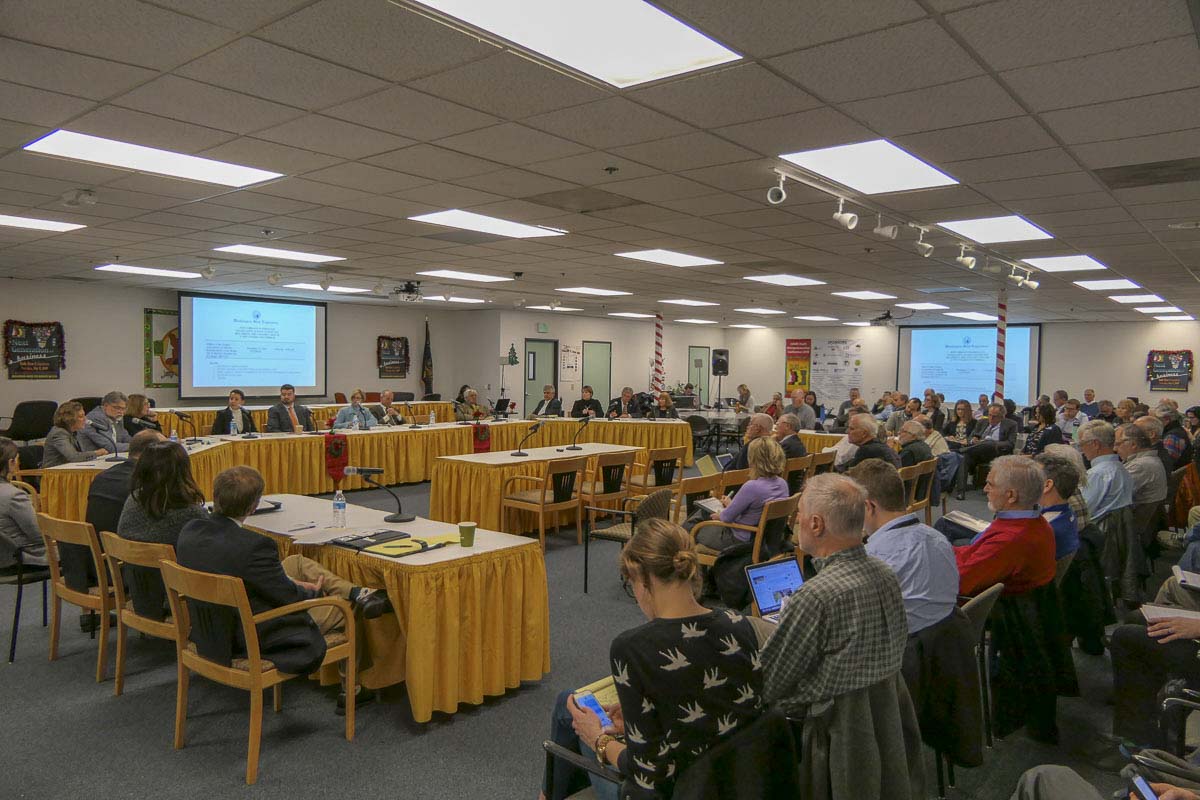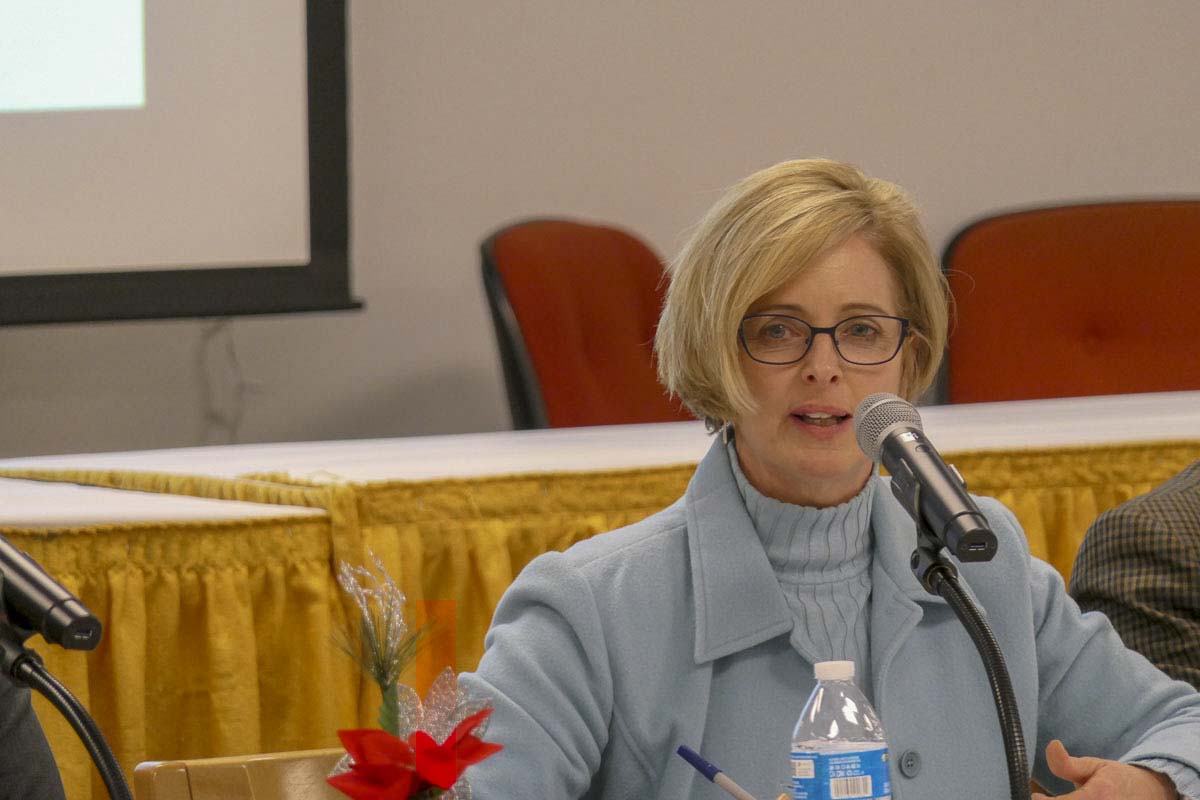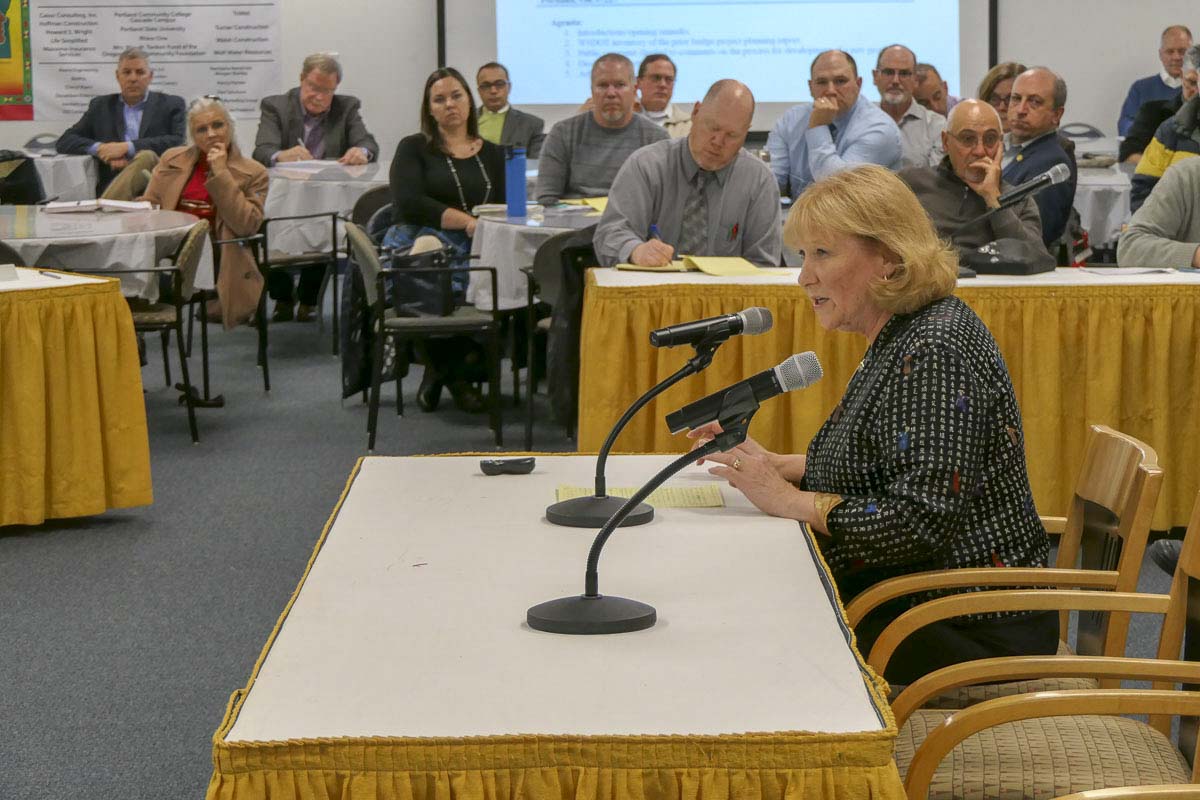The meeting was held at the request of Washington lawmakers eager to revive a project they helped kill four years ago
PORTLAND — Four years ago, plans to replace the aging Interstate Bridge on I-5 died on the vine when lawmakers in Washington state declined to set aside the funding for it.
One of the key critics of the Columbia River Crossing (CRC) project was Republican Sen. Ann Rivers who, earlier this week, sat with other Southwest Washington lawmakers as a member of the Joint Oregon-Washington Legislative Action Committee, in an attempt to rebuild a metaphorical bridge with lawmakers in Salem.

“There was no grave dancing on my part,” said Rivers. “Instead I reached out to my colleagues across the aisle and asked them to sit down with me to begin the process of starting something that could work. And what you see here today is the culmination of something that started four years ago.”
Rivers’ Democratic colleague, Sen. Annette Cleveland of Vancouver, chairs the committee, and said she’s optimistic things can end differently this time.
“We have engaged in that hard work of driving toward majority agreement, and we’re going to continue that work,” said Cleveland.
While the committee includes Oregon in the title, the lawmakers at the table from south of the Columbia River were there only as guests, rather than formal members. They included Sen. Lee Beyer (D-Springfield), Sen. Cliff Bentz (R-Ontario), Rep. Caddy McKeown (D-Coos Bay), Rep. Rich Vial (R-Scholls), and Rep. Susan McLain (D-Hillsboro).
It was clear from some of the comments made by the Oregon delegation that the wounds of the CRC demise were still fresh.
“I’m here to listen very carefully to the folks from Washington and see if they’ve reached a point where they can get their act together, and help in putting a project of this nature in place,” said Bentz, drawing a murmur from the mostly Washington-based crowd inside the Oregon Association of Minority Entrepreneurs building on Hayden Island in North Portland, “because there’s definitely a need for it.”
“We haven’t had a lack of process,” said Rep. Beyers, “what we’ve had is a lack of agreement on what to do.”
Aside from Rivers and Cleveland, the Washington side of the committee includes Rep. Brandon Vick (R-18th District), Rep. Sharon Wylie (D-49th District), Rep. Ed Orcutt (R-20th District), Rep. Jake Fey (D-27th District), Sen. Lynda Wilson (R-17th District), and Sen. Steve Hobbs (D-44th District) who was absent for Tuesday’s meeting.

“I think it’s also true for us to acknowledge the process that was laid out last time and the product that came across wasn’t one that met the needs or the desires of our constituents in some of the districts,” said Vick. “And so I think moving forward, when we get this process right and we get the public input right, when we get the solution that the voters want, I think you’re going to see that commitment because we’re going to have done the groundwork.”
Part of the process the committee has been engaged in is looking at what studies were done during the CRC process, to determine what might be salvaged for any future project.
During a presentation on that topic, Washington State Department of Transportation Southwest Regional Administrator Carley Francis outlined some sobering statistics regarding just how much worse things have gotten on both I-5 and I-205 across the river in recent years. In 2011, it took an average of six-and-a-half minutes at peak travel times to get from Main Street to Jantzen Beach on I-5. As of 2016 it was over 24 minutes — an increase of 278 percent. Those increased travel times came from an increase of just 7,300 vehicles per day on I-5, and nearly 17,000 more daily commuters on the Glenn Jackson bridge.
“This partnership is extremely important to the entire west coast,” said Rep. McClain. “It’s extremely important to our two states, and it’s extremely important if we’re going to have economic vitality that we all want for our businesses.”
Bentz added that he came to the meeting, “wondering if you guys can convince us that you’re for real.”
While the Washington delegation assured their Oregon colleagues they are very much for real, both sides acknowledged that things have moved on since the CRC when it comes to transportation funding. Last year, Oregon approved an eight year, $5.3 billion transportation package that included funding to study tolling on parts of I-5 and I-205, but not to raise money for a new Interstate Bridge project.
“I’ll be very candid from Oregon’s perspective,” Beyers said, “we had our $450 (million) set aside. We don’t anymore.”
Rep. Ed Orcutt countered, reminding his Oregon colleagues that Washington is now in the third year of a 16-year transportation deal.
“As long a package as we’ve got out there, I’m still sitting at this table,” he said.
One bit of potential pressure on the group is approximately $150 million spent in planning work for the CRC project, which the Federal government says must be repaid. A five-year extension on repayment ends in September of 2019, and any further extension has been denied unless both states can show that they are moving forward on new plans to replace the bridge.

Go big or go home (slowly)
While studies done by both WSDOT and Oregon transportation officials in the lead up to the CRC showed that a third crossing over the Columbia would be difficult, several lawmakers said it may be time to revisit the idea.
Vial, who will be leaving office after losing a re-election bid last month, said he remains the chair of the Washington County Commission, and hopes that there can be conversations about a new west side crossing.
“Washington County may not seem like a part of this conversation but let me tell you, it has to be,” said Vial. “That is where Portland’s congestion problem is now originating.
“We can build that bridge, but then what happens when you go across it to the south? You run into the Rose Quarter, and you run into the Terwilliger curves,” Vial added. “Eventually you run into Wilsonville and the Boone Bridge. We have not really solved that north-south congestion unless we include that as part of this conversation.”
Orcutt said he agrees that the I-5 Bridge is in dire need of replacement, but that he would like a third crossing explored as part of any package to replace the existing span.
“I represent Cowlitz County,” Orcutt said. “It has a population of 100,000 people. It has five crossings across the Cowlitz River. It has a total of eight lanes in each direction. There’s only seven lanes in each direction getting across the Columbia River from Clark County into Oregon. For a population five times the size, who now says that there aren’t enough crossings, there aren’t enough lanes.”
Process, not project
Sen. Cleveland was quick to say that this week’s meeting was about defining the process of getting to a project, rather than talking about any specific ideas. That didn’t stop a slew of citizens from getting up to spend their two minutes advocating for more lanes, a third crossing, a tunnel under the river, high speed rail, and whether or not mass transit should be included.
“What we’re hopeful about is that we might move into a discussion of a possible recommendation by this body,” said Cleveland, referring to a recommendation about whether the bi-state committee should be made official and whether conversations should continue.
“I can assure you I am not enthusiastic about going through that process again without there being a commitment from our wonderful neighbors to the north that this time they will be there,” said Bentz.
“Do I want to spend more time on this? No,” said Beyers. “Do I think that we should? Probably.”
“I think what you’re hearing from this side of the table at this point is we need commitment up front, in the middle, and at the end,” added McLain.
While nearly every member of the Oregon delegation said that they were open to remaining in contact regarding the project, no firm dates were set for further meetings.
Sen. Rivers wrapped up with a few comments for the gathered crowd, many of whom she said had sounded alarm bells that “the CRC is back! The CRC is back!”
“I hope that you will sound the alarm that you were wrong,” said Rivers. “I hope you will go to your blogs and say, ‘wow, they don’t even have a process yet. Maybe I should reserve judgement and see what they come up with.'”




